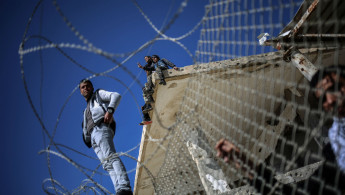Israel imposes new travel restrictions at Gaza border
Israel has imposed new travel restrictions on Palestinians exiting the Gaza Strip via the Erez crossing, preventing them from leaving with laptops, food and toiletries.
Israeli rights group Gisha said the new directive was implemented on 1 August and will "encumber those passing, with no clear purpose".
The group was informed of the measures by COGAT, an Israeli defence body that administers the occupied Palestinian territories.
Food for personal consumption has been prohibited on the long hours it normally takes to leave Gaza, while all electronic devices apart from mobile phones are now prohibited, the group said.
Toiletries of any type, together with hard-sided luggage, are also banned.
"As if it weren't hard enough to get a permit, and as if the journey out of Gaza weren't already a challenge, this new directive just makes life a little more difficult for Gaza residents," Gisha said.
"It's hard to understand for what purpose".
 |
This new directive just makes life a little more difficult for Gaza residents |  |
The ban will also apply to Palestinian employees of international organisations, such as the United Nations, who require their laptops for work.
Non-Palestinians are exempt from the restrictions, and will only have to declare any electronic devices in their luggage.
"It can happen because Israel doesn't pay a price for inconveniencing Gaza residents, and just like that, from one day to the next, not even a sandwich can get through Erez Crossing," Gisha said.
Locked in
Palestinians in Gaza have been subjected to a strict Israeli blockade since 2007 which restricts the movement of goods and people in and out of the territory.
Exit permits issued by Israel are limited to businessmen, medical patients and humanitarian cases, such as families visiting relatives jailed in Israel.
Since the Egyptian-controlled Rafah crossing was closed in mid-2013 following a military coup, the Israeli-operated Erez, or Beit Hanoun, crossing has become the only gateway to the world for Gazans.
But the number of Palestinians allowed to leave Gaza via Erez has steadily declined in recent years.
During the first six months of 2017 around 6,300 exits were issued per month, a 55 percent drop compared to the same period last year.
 |
The Rafah crossing has been closed since mid-2013 following a military coup in Egypt. |  |
More than 500,000 exits were recorded in the first part of 2000, before the Second Intifada erupted.
The Palestinian Authority has contributed to the recent decline in exits by reducing the number of referrals for medical patients - a prerequisite to receive an Israeli permit.
The move was initiated as part of a raft of measures to pressure Hamas to cede power in Gaza.
The Rafah crossing with Egypt, previously the main exit and entry point for Palestinians in Gaza, has only been open for 11 days in 2017.
Only Palestinians meeting strict travel criteria are allowed to travel, with tens of thousands on long waiting lists for the intermittant openings.
Preference is often given to those selected by Egyptian authorities.
A strategic alliance between former Fatah strongman Mohammed Dahlan and Hamas had promised to open the Rafah crossing by the end of August, although it is unclear if such a measure will go ahead.





 Follow the Middle East's top stories in English at The New Arab on Google News
Follow the Middle East's top stories in English at The New Arab on Google News


